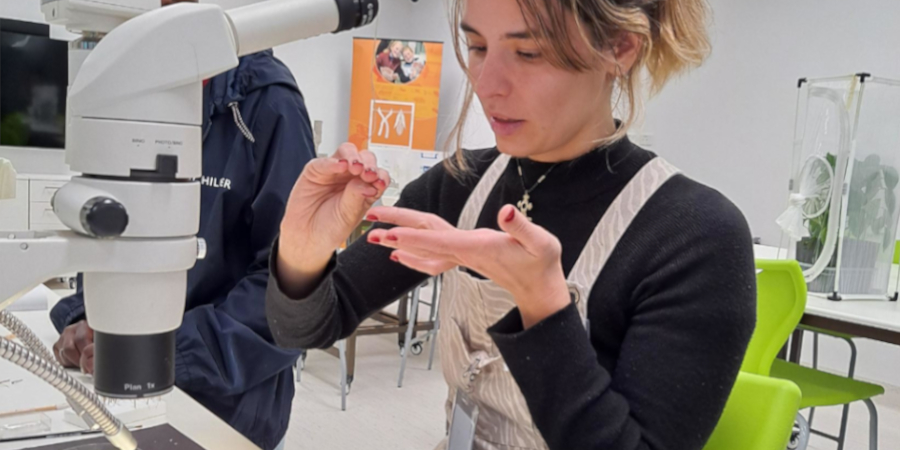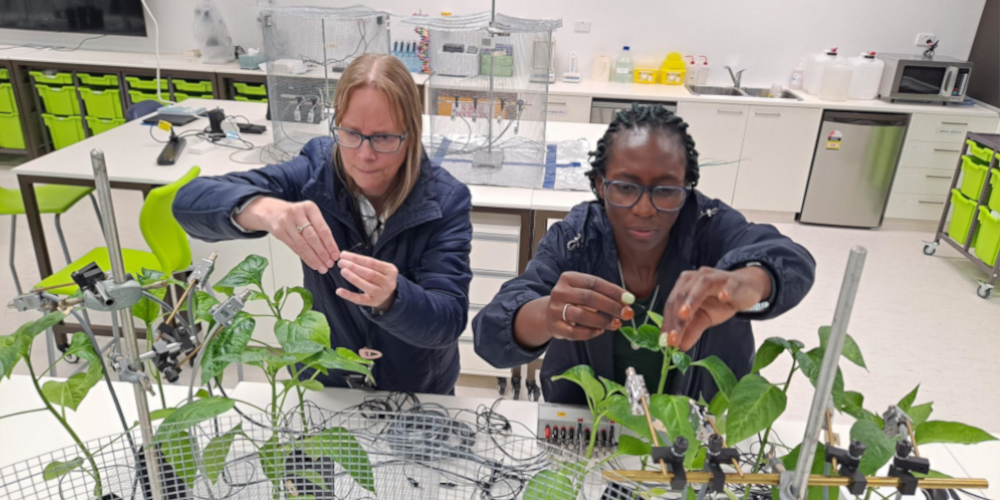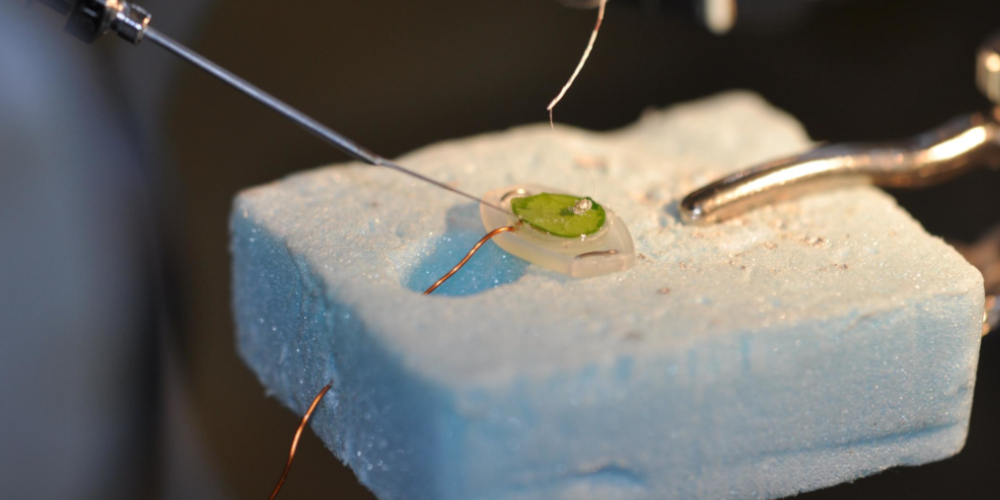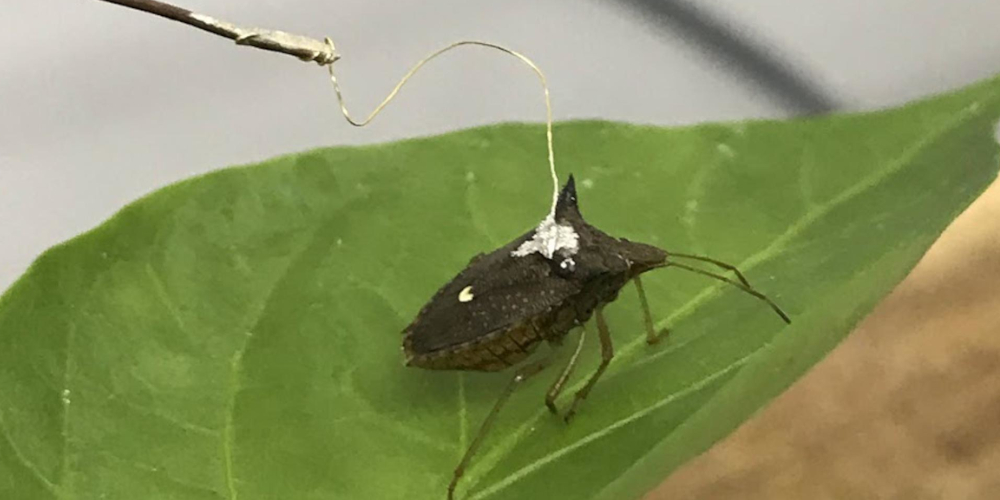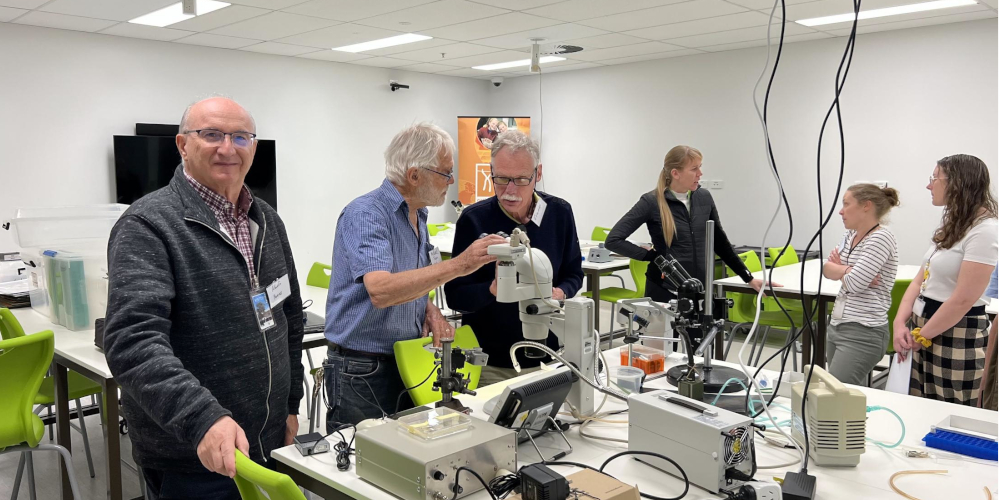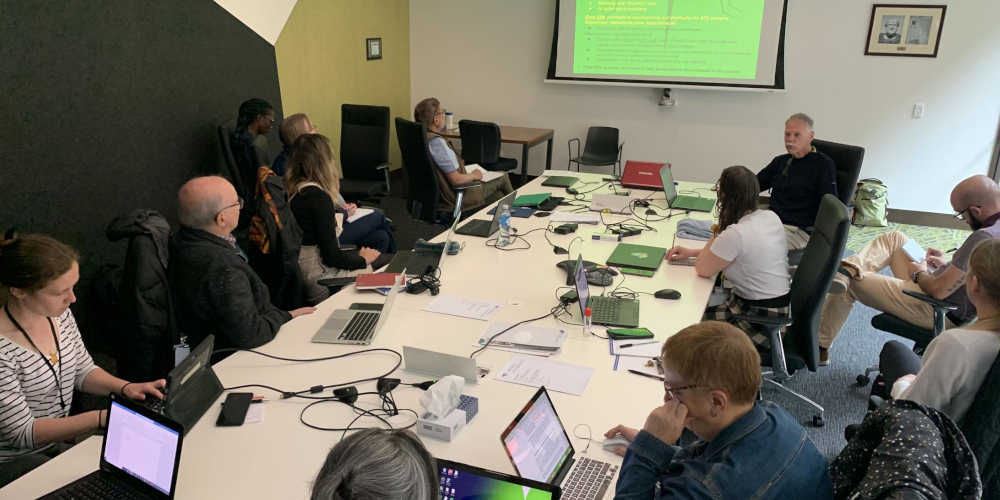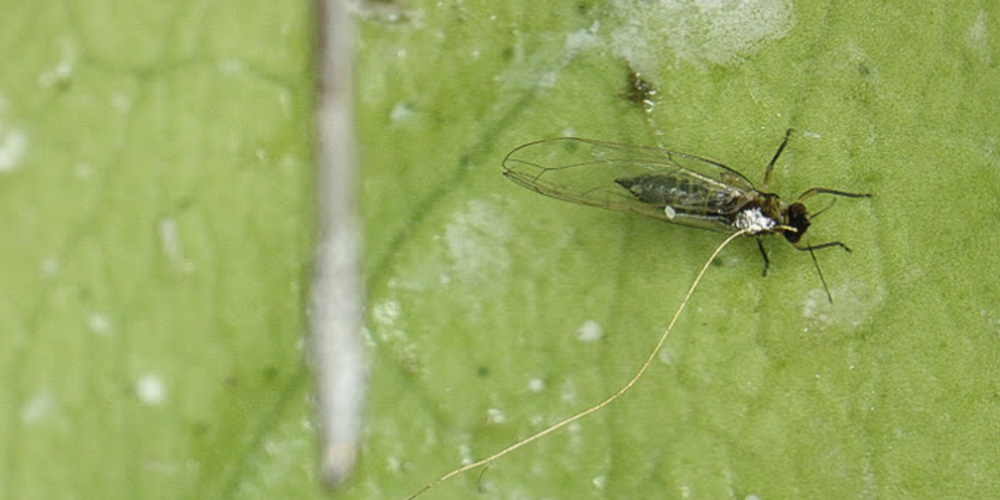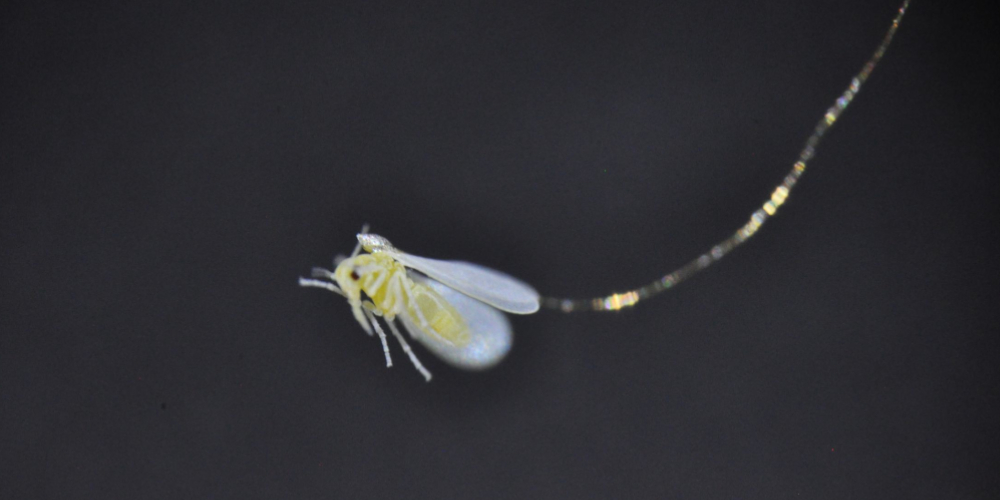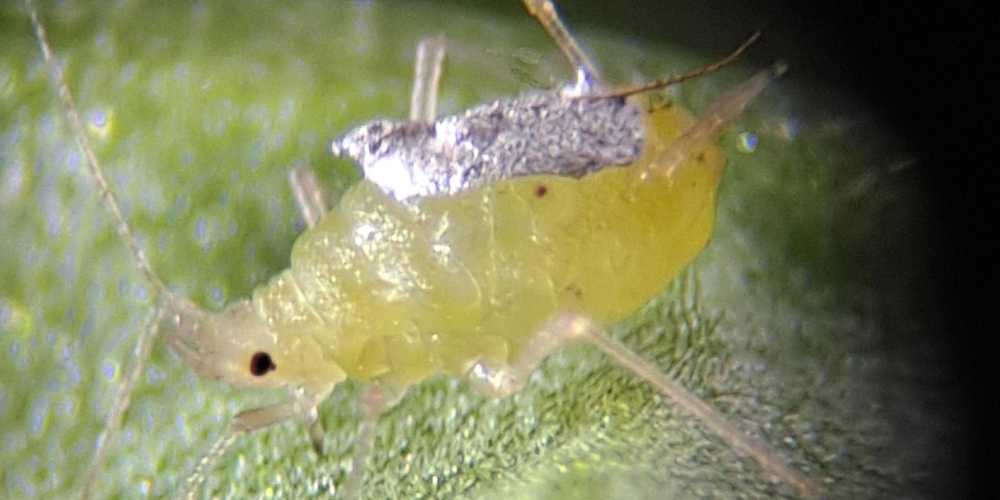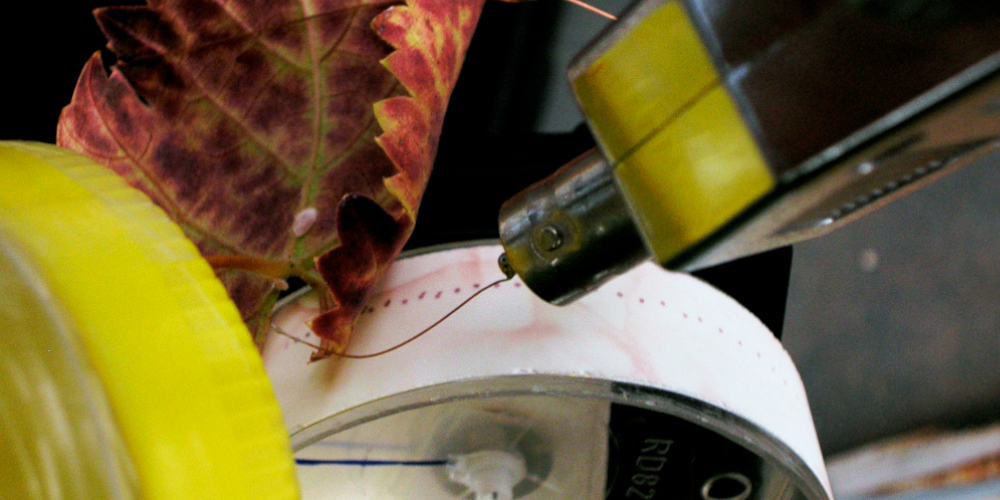
European EPG Workshop
Madrid, 16-19 June 2024
Organizers:
Alberto Fereres a.fereres@csic.es
Aránzazu Moreno amoreno@ica.csic.es
Elisa Garzo elisa.garzo@ica.csic.es
Clara Lago clara.lago@ica.csic.es
Jaime Jiménez jaimejimenez@ica.csic.es
Piotr Trebicki piotr.trebicki@mq.edu.au
Daniele Cornara daniele.cornara@uniba.it
Venue: ICA-CSIC (16-19 June 2024). Madrid, Spain.
Day 0: 16 June (at ICA-CSIC)
18:30h-20:00h Welcome Reception & Registration.
Day 1: 17 June
8:45-9:00 Registration (ICA-CSIC)
9:00-10:00 Keynote talk: Introduction to Electronic Monitoring of Insect Behaviour. History, Background & Electronics
Keynote Speaker: Prof. W.F. Tjallingii
10:00-10:30: EPG standard waveforms for different insects (waveform library): Phloem feeders
Speaker: Prof. Alberto Fereres
10:30-11:00: Coffee break & Poster Session
11:00-11:30 EPG standard waveforms for different insects (waveform
library): Xylem feeders.
Speaker: Dr. Clara Lago
11:30- 12:00 Non-standard EPG waveforms of aphids and waveform features
due
to device adjustments.
Speaker: Prof. W.F. Tjallingii
12:00-12:30. Participant talks
12:00-12:15 Insights from EPG with Whiteflies: Position-Fixation Techniques and Tethering
Speaker: Lize Braat
12:15-12:30 EPG as a tool to understand plant/arthropod interaction for crop protection
Speaker: Juan Manuel Alba Cano
12:30-14:00 Lunch & Poster Session
14:00-14:30 Wiring setting up EPG Equipment, calibration and
computerizer
data acquisition in EPG recording.
Speaker: Dr. Elisa Garzo
14:30-16:00 Afternoon Hands-on
16:00-16:30 Coffee break & Poster
16:30- 18:00 Afternoon Hands-on (cont.)
Day 2: 18 June
09:00 -9:30 EPG Analysis & data processing for phloem feeders
Speaker: Dr. Elisa Garzo
09:30-10:00 EPG analysis, data processing and workbooks for xylem
feeders.
Speaker: Dr. Daniele Cornara
10:00-10:30 Keynote talk. An interactive Platform for efficient automatic analysis of EPG signal of piercing sucking insects combining changepoint detection and Machine learning
Keynote Speaker: Prof. Bernard Reynaud
10:30-11:00: Coffee break & Poster Session
Guidelines for experimental design, data analysis and interpretation
Speaker: Dr. Aranzazu Moreno
11:30-12:00: Behavioural response to climate change
Speaker: Dr. Piotr
Trebicki
12:00-12:45 Participants talks
12:00-12:15 Speed and directionality of electrical signal propagation in plants in response to physical stress
Speaker: Claudio C. Ramírez
12:15-12:30 Identification of plant virus proteins responsible for the manipulation of host phenotype and vector behavior
Speaker: Quentin Chesnais
12:30- 12:45 Identification of plant cues involved in Rhopalosiphum padi's host alternation
Speaker: Rituparna Ghosh
12:45-14:00 Lunch & Poster Session
14:30-16:00 Afternoon Hands-on
16:00-16:30 Coffee break & Poster
16:30- 18:00 Afternoon Hands-on (cont.)
Day 3: 19 June
9:00-9:45 Applications of EPG technique: Transmission of plant
pathogens by insect vectors.
Speaker: Prof. Alberto Fereres
9:45-10:30: Keynote talk. Applications of EPG technique: Host plant
resistance and understanding mode of action of chemical compounds using EPG.
Speaker: Dr.
Beata Gabrys
10:30-11:00: Coffee break & Poster Session
11:00-11:30: EPG in combination with additional techniques: cryofixation, CT scan and confocal, stylectomy, video-tracking recording, artificial diets, honeydew clock
Speaker: Dr. Jaime Jimenez
11:30-12:00: Participants talks
Cellulose synthase gene expression analysis of Solanum lycopersicum exposed to combined effects of drought and TYLCV virus
Speaker: Samra Mirzayeva
Aphids as bioelectrodes to measure changes in plant membrane potential in parallel with physiological changes as a result of pathogen infection
Speaker: Torsten Will
12:00-12:30: Questions and Discussion
12:30-14:00 Lunch & posters
14:00-14:30 00 Afternoon ‘Hands-on’. EPG experiments coupled with video-tracking recording, cryofixation, artificial diets, honeydew clock
16:00-16:30 Coffee break & Poster Session
16:30- 18:00 Afternoon Hands-on
20:00h Closing dinner (Restaurante Tragantia, Calle del Príncipe de Vergara, 210, Chamartín, 28002 Madrid)
NOTE : Participants should bring their own laptop to the workshop and download and install the EPG installation software in advance (at: epg.csic.es/downloads)
Posters
Alteration of aphid feeding behavior in sugar beet genotypes results in decreased beet yellows virus transmission
Anabella Heintz, Quentin Chesnais, Camille Gutierez, Alessandra Maia-Grondard, Michael Stange, Sandra Otte, Martin Drucker, Véronique Brault
Does SBR - a new disease of sugar beet - affects the feeding behavior of Pentastiridius leporinus?
Brita Kais, J. Koehler, B. Czarnobai De Jorge, Anna Markheiser, J. Gross
Measuring principles in EPGs: Circuit properties and Ohm’s law relationships
Freddy Tjallingii
Cold treatment of infected plum fruits reduces the transmission of the PPV by aphids
Claudio C. Ramírez, Angélica González-González, Jessica Devia-Parra, Isabel Ramírez-Abarca, Mónica Madariaga
Exploring diurnal rhythms in aphid feeding behavior through the lens of the Electrical Penetration Graph Technique
Daniel Kunk
How do endosymbionts modulate plant virus transmission by aphid vectors?
Patricia Sanches, Consuelo De Moraes, Mark Mescher
AFTERNOON Hands-On PROGRAM
|
Day 1: Beginners Program EPG recording (data acquisition) DEMO EPG set up: - Equipment parts - Noise and Faraday cage - Amplifier test* Aphid, whitefly, spittlebug & stink bug wiring - Making an insect electrode (done) - Proper electrode attachment - Aphid and plant mounting* - Making an insect electrode - Stylet+-d acquisition software* - Start: name, comments & adjustments - starting*: 1) Giga ON 2) ‘insects ON’ - Optimal voltage adjustment* |
Day 2: Stylet+ software practice
- Automatic and comment lines - Manual conversion (separate conversion) Analysis software (stylet+a) - Use of day 1 data files or sample files - Moving, zooming and .ppt signal pictures - Exporting signal samples - Making a ‘Book of reference signals’ Retrieving EPG data - Cursor use and data grid - Saving the data grid - DATA PROCESSING SOFTWARE: - Excel Workbooks for calculation of EPG variables (3 programs) - Automatic EPG waveform recognition (2 Programs) |
|
Day 3: Demonstration: other techniques combinated with EPG - Honeydew clock for collecting droplets of plant sap - Cryofixation of aphid stylets - Stylectomy of aphid stylets - Video-tracking recording of spittlebug and aphid feeding - EPG recording in artificial diets Bring in any questions or problems |
|
* Program items that can be extended for advanced users:
- Special plant voltage adjustments
- Life establishing of R- and emf-components
- Event marks in unused channels
- Use of the calibration button and emf mode probes (innovation)
